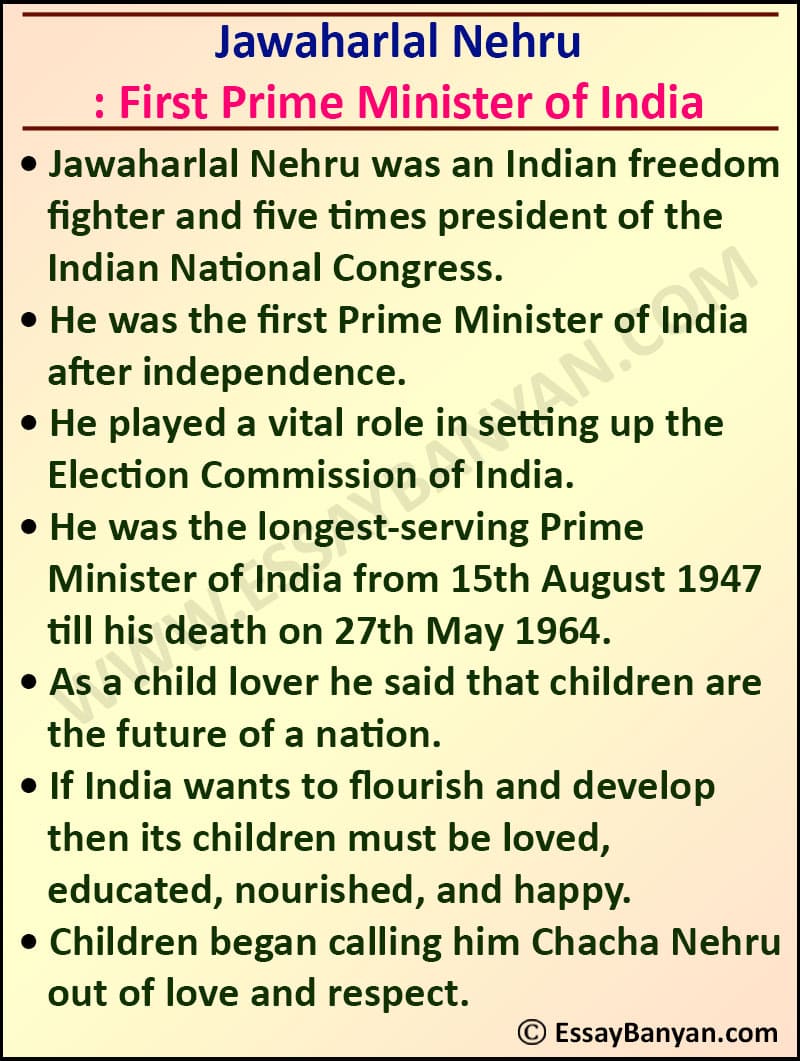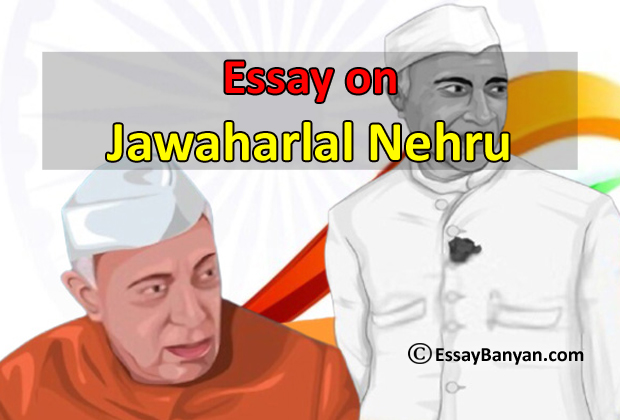Jawaharlal Nehru (November 14, 1889 – May 27, 1964) was an Indian freedom fighter and political leader associated with the Indian National Congress. His contribution to the Indian freedom struggle can’t be forgotten.
Short and Long Essays on Jawahar Lal Nehru in English
We will discuss his life, career, achievements, and motivations in the essays under words limit of 120 words, 250 words, 400 words, 500 words and 600 words given below.
Jawahar Lal Nehru Essay 10 Lines (100 – 150 Words)
1) Jawaharlal Nehru was a famous political leader and a freedom fighter.
2) Jawaharlal Nehru was the son of Motilal Nehru and Swarup Rani.
3) In 1916, Jawaharlal Nehru got married to Kamala Nehru.
4) He was the longest-serving Prime Minister who served India from 1947 to 1964.
5) He worked with Mahatma Gandhi and was an active participant in the freedom struggle.
6) Nehru was the leader of the famous party, the Indian National Congress.
7) Nehru Ji was elected as the first Prime Minister of India after independence.
8) Jawaharlal Nehru love children and worked for their development.
9) Due to his love for children, he was called ‘Chacha Nehru’ by children.
10) It was 27 May 1964, when Jawaharlal died due to a heart attack at the age of 74.
Essay 1 (250 Words) – Life and Achievements of Jawaharlal Nehru
Introduction
Jawaharlal Nehru was a freedom fighter whose name will always come up when people who struggled for the independence of India are discussed. He was among the very few leaders of that time who had the confidence of Mahatma Gandhi and worked closely with him.
Jawaharlal Nehru – Family
Motilal Nehru, the father of Jawaharlal Nehru was a wealthy lawyer at Allahabad High court. His mother Swarup Rani Nehru came from a Kashmiri Brahmin family and was a housewife. Jawaharlal Nehru was the eldest with two sisters.
The elder sister, Vijaya Lakshmi, rose to become the first female President of the United Nations General Assembly. The youngest sister, Krishna Hutheesing was a writer who had authored several books ex – With no Regrets: An autobiography.
Jawaharlal Nehru married Kamala Nehru in 1916 and had a daughter named Indira Gandhi who rose to become the first female Prime Minister of India.
Important Activities and Achievements
- Five times President of the Indian National Congress.
- Declaration of Independence and hoisting Tricolor at Lahore on New Year’s Eve 1929.
- Oversaw partition in his capacity as the Prime Minister of India.
- As the Prime Minister of India, he played a vital role in setting up the Election Commission of India.
- The Indus water treaty between Pakistan and India was signed between Pakistan’s President Ayub Khan and Prime Minister of India, Jawaharlal Nehru.
Conclusion
Jawaharlal Nehru remained the Prime Minister of India from 15th August 1947 till his death on 27th May 1964. He is by far the longest-serving Prime Minister of India.
Essay 2 (400 Words) – Jawaharlal Nehru: Life and Freedom Struggle
Introduction
Jawaharlal Nehru was an Indian freedom fighter and senior leader of the Indian National Congress. He actively participated in the freedom struggle, working closely with Mahatma Gandhi. Nehru also rose to become the first Prime Minister of India after independence.
Children’s Favorite
Nehru’s childhood was spent in a privileged and protected environment. May be due to this reason he felt that every child must be given a favorable and loving environment, conducive to growth.
His love for the children grew only stronger with time. He was among the very few Indian leaders who openly voiced his opinions about the children. He had said that children are the future of a nation and if India wants to flourish and develop then its children must be loved, educated, nourished, and happy.
Also, when campaigning throughout the country, Nehru would often stop to chat with children. The children began calling his Chacha Nehru out of love and respect.
A Lawyer by Fate
Jawaharlal Nehru’s father, Motilal Nehru was an influential Barrister in Allahabad court and was wealthy as well.
Though, his father had been two times President of the Indian National Congress, Nehru had no such ambition. In 1910 he graduated with an Honors degree in natural science from Trinity College in Cambridge. Thereafter, he moved to London to study law at Inner Temple London.
In 1912, Nehru joined as a barrister in Allahabad High court but wasn’t very pleased with his career as a lawyer. He had mentioned that he neither enjoyed his profile as a lawyer, neither the company of lawyers. He had gotten more and more involved in the freedom struggle, gradually replacing his lawyer profession.
A Contemporary of Gandhi
Jawaharlal Nehru had been a close associate of Mahatma Gandhi and stayed loyal to him till his assassination after independence. Nehru earned the confidence of Mahatma Gandhi while participating in the 1920 non-cooperation movement.
Two years later, in 1922, when Gandhi called off non-cooperation movement and many leaders unhappy with the decision, parted their ways with Gandhi; Nehru on the other hand remained loyal to Gandhi and at his side. Gandhi and Nehru were at the center of every major political and revolutionary activity in British India. In every political decision of Nehru, there was the backing of Mahatma Gandhi.
Conclusion
The freedom struggle of India wouldn’t have been complete without mentioning Jawaharlal Nehru and his contribution. Whenever the great freedom fighters of India will be discussed, the name of Jawaharlal Nehru will come up.

Essay 3 (500 – 600 Words) – His Life and Indian National Movement
Introduction
Jawaharlal Nehru was a freedom fighter and a contemporary of Mahatma Gandhi who became the first Prime Minister of India after independence. The contribution of Nehru in the freedom struggle is significant and he had been at the helm of many revolutionary activities.
Wealthy and Influential Family Background
Jawaharlal Nehru was born on 14th November 1889 at Allahabad in United Province, present-day Uttar Pradesh. His father, Motilal Nehru was a wealthy Barrister in Allahabad and also had been two times President of the Indian National Congress, first in 1919 and then in 1929.
Motilal Nehru was an influential person with contacts both in Indian political circles as well as the British administration. He also regularly donated funds to activists like Chandrasekhar Azad and Bal Gangadhar Tilak, to name a few.
Some even believe that the clothes of Motilal were sent to a foreign country for dry cleaning; however, there is no substantial evidence to prove this and it just might be a rumor.
Uneventful Childhood and Influences
In the own words of Jawaharlal Nehru, his childhood had been uneventful. His childhood was spent in a protective environment in Anand Bhavan, a palatial estate in Allahabad, which was the Nehru family’s ancestral home.
Nehru obtained his basic education at his house only, as being able to afford, his father had arranged for private tutors and caretakers for him. Nehru developed an interest in theosophy, a religion founded in the United States during the late 19th century.
Henceforth, Nehru at the age of 13 was inducted into the Theosophical Society formed by Annie Besant, who was a family friend. However, as fate would have it, Nehru’s association with the Theosophical Society didn’t last long and he soon dropped out of it.
In his writings, Nehru has specifically mentioned about one of his teachers, Ferdinand T. Brooks, who had been with him for nearly three years. It was under Brooks’ influence that Nehru developed an interest in theosophy.
Participation in Indian National Movement
Nehru’s active participation in the Indian freedom movement began after he attended a conference of the Indian National Congress at Patna in 1912. He actively collected funds for the support of Mahatma Gandhi’s Civil Rights Movement in South Africa. He became active in campaigning against the discriminatory policies of the British against the Indians.
After the First World War 1914-1915, Nehru emerged as a radical leader, who would often express his disagreement over political moderators like Gopal Krishna Gokhale, who thought that thinking of independence is madness.
Soon, Nehru joined the Home Rule National Movement, initiated by Annie Besant and Bal Gangadhar Tilak. Nehru rose to become the secretary of Annie Besant’s Home Rule Movement.
Nehru became an active participant in the 1920 non-cooperation movement led by Mahatma Gandhi. He was also jailed for few months in 1921 on the grounds of participating in anti-government activities. Later in 1922, when Gandhi called off the non-cooperation movement, in wake of the Chauri Chaura incident, Nehru remained loyal to Gandhi on his sides.
In the coming years, Nehru became the second most influential leader in India, second only to Mahatma Gandhi. He spearheaded the Indian National Congress in anti-British movements and demand for complete independence or Purna Swaraj.
In fact, Nehru was among the first leaders to demand complete independence and breaking all ties, whatsoever, with the British government. On New Year’s Eve 1929, Nehru hoisted the Tricolor at Lahore and read the declaration of Independence.
Conclusion
Jawaharlal Nehru chose a life of struggle and uncertainty when he could have easily chosen one with wealth and comfort. At the time when he jumped into the freedom struggle, he wasn’t sure whether he would survive or be imprisoned for his whole life. Nevertheless, he did what his love for motherland had inspired him to do and the outcome is known to us all.
FAQs: Frequently Asked Questions on Jawaharlal Nehru
Ans. The birth anniversary of Jawaharlal Nehru is celebrated as Children’s day in India.
Ans. Jawaharlal Nehru was a Lawyer by profession.
Ans. The newspaper started by Jawaharlal Nehru was the ‘National Herald’.
Ans. Jawaharlal Nehru served as the Prime Minister of India for 18 years from 1947 to 1964.
Ans. The memorial of Jawaharlal Nehru is called ‘Shantivan’.
Ans. ‘Tryst with Destiny’ was the famous speech delivered by Jawaharlal Nehru.
Related Information:

